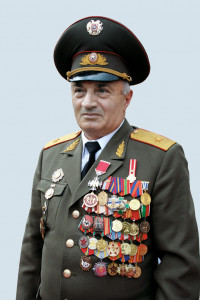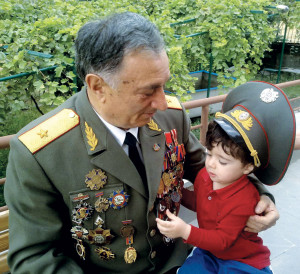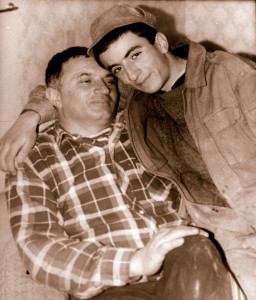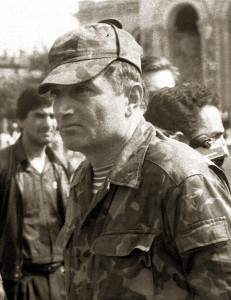THE SYMBOL OF OUR LATEST VICTORIES
 One of the brightest symbols of our army’s brilliant victories, perhaps the brightest, the bearer of the true Armenian gene, the general who liberated the Armenian cultural center Shushi, the brightest person, the national hero of Artsakh Armenia, Major General Arkady Ter-Tadosyan, would have turned 82 on May 22. This most modest man was known and loved by everyone, from the youngest to the oldest. His heroic path is rich and symbolic. Much has been said about our glorious general and much will be said. Today, his son, Hayk Ter-Tadjosyan, Deputy Chairman of the DOSAF All-Armenian Patriotic NGO of Armenia, Director of the DOSAF Sniper LLC, will share his memories of him.
One of the brightest symbols of our army’s brilliant victories, perhaps the brightest, the bearer of the true Armenian gene, the general who liberated the Armenian cultural center Shushi, the brightest person, the national hero of Artsakh Armenia, Major General Arkady Ter-Tadosyan, would have turned 82 on May 22. This most modest man was known and loved by everyone, from the youngest to the oldest. His heroic path is rich and symbolic. Much has been said about our glorious general and much will be said. Today, his son, Hayk Ter-Tadjosyan, Deputy Chairman of the DOSAF All-Armenian Patriotic NGO of Armenia, Director of the DOSAF Sniper LLC, will share his memories of him.
When he returned from the fighting, after three months and six months of absence, the first thing he did was hug us, kiss us, and be sure to be with us for a few hours, talking to my sister and me for a long time. He asked about school success, what new books have I read? Since I knew that was what he was going to ask, I found it easy. “I read a large Soviet encyclopedia.” He understood, he said. “Which letter did you reach?” He would take it and start asking questions from different places. To be honest, I answered everyone. I could tell from his smile and kisses that he was happy with me.
The most disliked thing was lying. Frankly, I had that experience. As a child, I tried to hide for fun, but of course he knew, and I was punished. After punishing, he explained. “The bitter truth is better than the sweet lie.” He was saying. “If you made a mistake, tell me to find a solution together, otherwise the situation will double.” Thus, from a young age I understood that the truth is the only one. There is no such thing as this or that.
Now I think and understand that he, being a mathematician by profession, was in favor of accurate calculations. You need accurate numbers to get the right solution. If the numbers are wrong, the right solution will not be found. He also looked at life problems as mathematical equations. He needed the right information. Having one unknown, we could find the other, but if we misrepresented, we gave another instead of one unknown, he was already seriously angry. I have had two such experiences in my life, I felt his fatherly anger. I needed it. I raise my children, 11-year-old Hovhannes and 10-year-old Mariam, in the same spirit.
When I turned 17, I told my father on my birthday that if God gave me children, I would name my son after my paternal grandfather, Hovhannes, and my daughter, after my grandmother, Mariam. God gave them to me. Mariam was born on my grandmother’s birthday. I said. “Grandpa, I kept my promise.”
 I wanted to go the military way myself. I was preparing, I was getting physically fit – sports, martial arts. I wanted to go to a nuclear airborne college. My mother objected. I had to leave our country. We discussed with our family and realized that we should be here in Armenia. The path of the military is very difficult. My father said that he, as a soldier, would do whatever was necessary. He advised me to become a historian, to contribute to the consolidation of our recent history. I was enrolled to YSU Faculty of History. I was always with him at meetings with his father’s comrades-in-arms.
I wanted to go the military way myself. I was preparing, I was getting physically fit – sports, martial arts. I wanted to go to a nuclear airborne college. My mother objected. I had to leave our country. We discussed with our family and realized that we should be here in Armenia. The path of the military is very difficult. My father said that he, as a soldier, would do whatever was necessary. He advised me to become a historian, to contribute to the consolidation of our recent history. I was enrolled to YSU Faculty of History. I was always with him at meetings with his father’s comrades-in-arms.
I never perceived my father as a Commandos, a general, he was just my father. When I was asked. “Did you see your dad’s interview on TV?” I was answering. “To be honest, we were working with him on the land at that time.” He would come home, take off his uniform and say: “Let’s go down to the plot.” I did not particularly like working with the land, but the general had given the order… He liked working the land very much. He sowed seeds, rejoiced in every sprout. I remember we planted tomatoes, the bushes had already grown. I accidentally injured one of my legs while working. You can not imagine what happened. The woman was working at home, hearing the sounds heard from the garden, she jumped out. “Fascist, you have already killed a living being!” At first I did not understand what had happened. I looked around to see what crime I had committed and saw a broken tomato bush. “Well, it was just a sliver.” Heth looked at me. “No, it was life.” There I realized that working in the park was a symbolic action for him. He was planting life instead of the devastation he saw in his military life, the human casualties…
When I was 17, he gave me a military code, he said the slogan for the Russian army, then the slogan for our national army. “The highest value is the MOTHERLAND. It is your home, your surroundings, your neighbors պետք You must love everyone in your homeland. Bad person, good person … there is no such thing. everyone is yours, part of you. That’s all OURS.” He was saying. For this highest value, you must be willing to give everything, even your life. “Your life to your homeland, your soul to God, your honor to you.” These are not words. This is a great philosophy that I have always been reminded of.
He was an officer of the Soviet army. He should have been an atheist, but he was always a believer in his heart.
As a historian, I was fortunate to see the original maps of the liberation of Shushi. Valeri Chitchyan, the commander of one of the directions, did a great job. One of his comrades-in-arms was especially connected with “Yura of 26”. We were neighbors, we always visited each other’s home. They told what military actions were taken before the liberation of Shushi.
 Since there were no means of communication during the war, he communicated with his family through videos. Comrade-in-arms were filming us, taking us to show him. This is how he sent us messages. It was the “viber” of those times. We passed the letters through Zori Balayan. Before the operation in Shushi, my mother wrote a letter to my father describing how Suvorov had defeated a 100,000-strong Turkish army with a 25,000-strong Russian army near the Rimnik River. He wrote: “The main enemy of the Turks is panic.” She folded it and gave it to Zori to pass on to my father. My father had read. “All women are like women, mine writes to me how to fight with Turks”:
Since there were no means of communication during the war, he communicated with his family through videos. Comrade-in-arms were filming us, taking us to show him. This is how he sent us messages. It was the “viber” of those times. We passed the letters through Zori Balayan. Before the operation in Shushi, my mother wrote a letter to my father describing how Suvorov had defeated a 100,000-strong Turkish army with a 25,000-strong Russian army near the Rimnik River. He wrote: “The main enemy of the Turks is panic.” She folded it and gave it to Zori to pass on to my father. My father had read. “All women are like women, mine writes to me how to fight with Turks”:
During the 44-day war, my sister sent me an excerpt from a book by Clausewitz, a Prussian military commander and military theorist. I read. “People’s militia in Gorah – the invincible force”: And all this spiced with tactical nuances. He was in DOSAF, I entered my father’s room, I said. “Daddy, you have a very special family. “Your wife was teaching in 1992, and your daughter is teaching now.” I read what she had sent, he smiled….
Before each operation, my father developed a “stratogen”, translated from ancient Greek, a military ruse. During the last war he had a work map until the end, he was in touch with the commanders, he was trying to get the necessary information. He relied on the commanders on the front line with whom he had won the first war. “He always kept his hand on the pulse.” As for Shushi, there was a good word he always said. “Only Armenians can liberate Shushi.” It can be said that liberating that city is our monopoly. As an Armenian, as a Christian and as a military man, my father was sure that Shushi would not fall…
The news was very hard: We always had the feeling that Shushi was my father’s third child. As a parent, he felt the same way when he left us… During one of the interviews, he named my son. “Hovhannes will bring it back,” he said. This is not a lyrical word, but I want to mention a story. We sprinkled a variety of colorful toys on the ground with the traditional “grain” of Hovhannes, with them Daddy’s military belt, dull and brown, that should not attract the attention of a small child. I put the farthest. He had to make an effort to achieve that. He went through the colored toys and picked up the item. I consider it symbolic. There will be more weddings in our re-liberated Shushi.
… My marriage ceremony was to take place in Yerevan. We were preparing. My father was in a kind of incomprehensible mood. He was looking back and thinking. Then he asked. “Your wedding here?” He called in the evening. “Would you like us to have your wedding in Shushi?” “That will be my greatest happiness.” “So it is decided.” Our wedding ceremony took place in Ghazanchetsots Church in Shushi, we celebrated in Stepanakert. I remember the happiness of the people we took to Armenia by tourist buses that day.
He had a favorite word. “It is enough to talk, do business, be useful to the Homeland.”
 We were in Belarus before coming to Armenia. My mother played a key role in bringing us back to Armenia. He is from Gyumri. He was brought up in the spirit of Armenianness. One day he said to my father. “Let’s go to Armenia. Our daughter is growing up, your son is maturing. Let’s go back to our roots. ” My father made a decision, we came. What was happening in Armenia at that time was anti-state in the eyes of a Soviet officer. Mom was protesting and Dad was doing military work. He used to say to my grandmother, his mother-in-law: “We will be the man and woman to get divorced because of political disagreements.” Then he left for Artsakh to provide medical care; what he saw there was a turning point in his life. I think the Armenian gene immediately woke up in him. He was the grandson of a priest. Our ancestors were from Kars. My father told me as a child that the priest of the church had burned his grandfather’s family in the church by the Turks. Our priestly ancestor’s Testament, which he brought from Kars, is still kept in our house. My father always took that Testament with him wherever he went.
We were in Belarus before coming to Armenia. My mother played a key role in bringing us back to Armenia. He is from Gyumri. He was brought up in the spirit of Armenianness. One day he said to my father. “Let’s go to Armenia. Our daughter is growing up, your son is maturing. Let’s go back to our roots. ” My father made a decision, we came. What was happening in Armenia at that time was anti-state in the eyes of a Soviet officer. Mom was protesting and Dad was doing military work. He used to say to my grandmother, his mother-in-law: “We will be the man and woman to get divorced because of political disagreements.” Then he left for Artsakh to provide medical care; what he saw there was a turning point in his life. I think the Armenian gene immediately woke up in him. He was the grandson of a priest. Our ancestors were from Kars. My father told me as a child that the priest of the church had burned his grandfather’s family in the church by the Turks. Our priestly ancestor’s Testament, which he brought from Kars, is still kept in our house. My father always took that Testament with him wherever he went.
There is a lot of humor in this story that he was telling. Well, everyone was an “agent”, right? The officer is crucified after leaving the military unit. Harjan sees, informs the counterintelligence. They call the military. “Are you a believer?” “No.” “Then why are you crossing yourself?” “I’m checking whether the furajkas is in my head, whether the corpse is in place, party “Is my booklet in my left breast pocket? Is my military booklet in my right pocket?”
When he went to Artsakh, it was as if he was out of breath. Every time he returned, he would open the body of the car and bring a tree with a root and a flower. He found some rare plants in Artsakh on the Internet and told those who left to find them and bring them. Poor people sometimes toiled for months, looking for the plant he wanted, finding it, bringing it. Now there are very good vines in our garden that are brought from Artsakh. Sent by Dad’s fighting friend. Everyone has a name. One is Leonid Azgaldyan, one is Monte… These vases, interestingly, never spoil. do not need to be injected. We also brought some soil with those vines to mix with the soil here so that they become stronger. It is a very tasty grape. When we had guests, he would put them in bags with everyone. He did not miss complaining about me to the guests every time. “I told Hayk, he forgot about water again” …
Here are the photos: Here, under the cover, not in the album, there is a picture. He is brave, my father’s driver. (By the way, Kajik, Kajik Hovsepyan, is the same driver who took captive Azeris to exchange during the events in Khojaly. who freed his compatriots from captivity.” At first I did not understand why he did not put it inside the album. Now I understand. Kajik is a special person. My father loved her very much. He told a legendary story about Kajik…
By KNAR TADEVOSYAN
Category: #19 (1390) 19.05.2021 - 25.05.2021, National army, Spotlight










